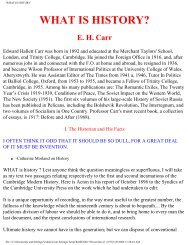The bronze age and the Celtic world - Universal History Library
The bronze age and the Celtic world - Universal History Library
The bronze age and the Celtic world - Universal History Library
Create successful ePaper yourself
Turn your PDF publications into a flip-book with our unique Google optimized e-Paper software.
THE ARYAN CRADLE 133<br />
philologists, from <strong>the</strong> evidence of langu<strong>age</strong> alone, were prepared to give full <strong>and</strong> most<br />
detailed explanations.<br />
Thus arose <strong>the</strong> Aryan hypo<strong>the</strong>sis, forced upon an e<strong>age</strong>rly inquiring public wdth<br />
great enthusiasm <strong>and</strong> complete, or almost complete, agreement. But during <strong>the</strong><br />
eighties rifts appeared to disturb this harmony, anthropology <strong>and</strong> archaeology began<br />
to claim a hearing, <strong>and</strong> to disagree with <strong>the</strong> conclusions of philology. By 1890 <strong>the</strong><br />
philological enthusiasm died out, at least in this country <strong>and</strong> in France, though for<br />
a time it Hngered on in Germany. AU those acquainted with <strong>the</strong> subject felt that <strong>the</strong><br />
question needed reconsideration, partly in <strong>the</strong> light of more accurate philological study,<br />
<strong>and</strong> especially having regard to <strong>the</strong> newer evidence being produced in such quantities<br />
by <strong>the</strong> sciences of anthropology <strong>and</strong> prehistoric archaeology. <strong>The</strong> general pubhc,<br />
however, continued to talk <strong>and</strong> to write, with more confidence than before, of Teutons,<br />
Celts, Slavs <strong>and</strong> <strong>the</strong> Latin races.<br />
A word as to <strong>the</strong> term Aryan. When it was found that Sanskrit was alUed to<br />
most of <strong>the</strong> European langu<strong>age</strong>s, it was felt that a term was needed to describe <strong>the</strong><br />
group. Bopp, thinking that <strong>the</strong> German or Teutonic group was <strong>the</strong> most westerly,<br />
as <strong>the</strong> Indian dialects were <strong>the</strong> most easterly, used <strong>the</strong> term Indo-Germanic, which had<br />
previously been suggested by Klaproth in 1823.' But when it was fully reahsed that <strong>the</strong><br />
<strong>Celtic</strong> tongues were also included in <strong>the</strong> group, French <strong>and</strong> Itahan scholars, who felt that<br />
<strong>the</strong> term German was receiving too much prominence, suggested <strong>the</strong> name<br />
Indo-European. Nei<strong>the</strong>r of <strong>the</strong>se terms is quite accurate <strong>and</strong> both are clumsy, so to<br />
avoid <strong>the</strong> latter defect Professor Max-Miiller suggested <strong>the</strong> term Aryan. This, too,<br />
is misleading, for <strong>the</strong> Aryas were <strong>the</strong> noble caste among <strong>the</strong> Vedic Indians <strong>and</strong> <strong>the</strong><br />
early Persians. <strong>The</strong> name, however, is convenient, <strong>and</strong> is still used by many people,<br />
especially in this country. Recently Dr. Giles* has suggested for <strong>the</strong> original people<br />
who spoke <strong>the</strong>se tongues <strong>the</strong> name of Wiros, as words similar to this, meaning men,<br />
occur in most of <strong>the</strong>se langu<strong>age</strong>s. <strong>The</strong> term has much to recommend it, <strong>and</strong> it will be<br />
used in <strong>the</strong> following p<strong>age</strong>s for <strong>the</strong> first users of this speech.<br />
When <strong>the</strong> connection between <strong>the</strong>se langu<strong>age</strong>s was first realised, it was felt that<br />
all <strong>the</strong> tongues had been derived from a primitive mo<strong>the</strong>r speech, <strong>and</strong> that this primitive<br />
3 Klaproth (1823). 4 Giles (1910-11) ; 1922,66.<br />
9a







